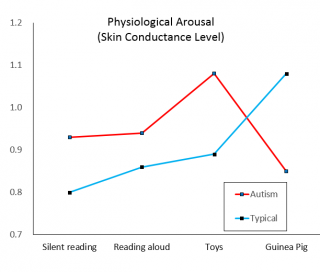Autism
The Beneficial Effects of Animals on Children With Autism
Do children with autism disorders respond differently to animals?
Posted May 4, 2015
A couple of years ago I asked Temple Grandin if people with autism have a special ability to relate to animals. She is, of course, widely known for both her

research on farm animal behavior and welfare and for her books on autism. She believes her autism gives her an unusual ability to think like, for example, a cow being herded down a chute in a slaughterhouse.
I was interested in this issue because my friend Ellen has two autistic sons. Ellen told me that one of the kids, John, has especially deep relationships with their family’s dogs. This is not the case, however, with his brother Tim. The dogs freak Tim out. “They are just too unpredictable for him,” she said.
When I told Temple Grandin about the boys and their completely different relationships with dogs, she was not surprised. She said that, in her experience, about a third of people with autism are unusually good with animals, about a third are terrible with animals, and a third, are about average in how they get along with other species.
But it would depend on the type of animal. A recent study published in the journal Developmental Psychobiology suggests that Guinea pigs might be the animal of choice for some children with autism.
The Study
The research was part of a series of studies by Purdue University’s Marguerite O’Haire and her colleagues on the impact of Guinea pigs in classrooms. The team had already found that school children with autism spectrum disorders (ASD) show improved social skills after interacting with Guinea pigs for a couple of months (here). And in another study, they found that these kids talk, smile, and laugh more and whine, cry, and frown less in the presence of a Guinea pigs (here). The new study went a step further by examining the biological processes underlying the impact of interacting with animals on children with ASD (here). Specifically, the researchers wanted to see if playing with Guinea pigs would reduce social stress in children with autism-related disorders.
The design of the study was simple. Thirty-three ASD children and 66 “neuro-typical” children between the ages of five and twelve were tested in groups of three. Each group included two typical kids and one ASD kid. The experimental sessions lasted 30 minutes, and during them the children were exposed to four conditions, one after the other. They were:
- -Silent reading (5 minutes)
- -Reading out loud to the group (5 minutes)
- -Free play in the group with a toy (10 minutes)
- -Free play in the group with a Guinea pig (10 minutes)
Measuring Biological Arousal
To assess changes in physiological arousal levels of the children over the four conditions, the researchers used special wrist bands that measure “electrodermal activity.” This is the ability of your skin to conduct low levels of electricity. It is a commonly used index of sympathetic nervous system activity. Skin conductance increases when you are emotionally aroused, stressed, excited, or physically active, and it decreases with you are relaxed, inactive, or bored.
The researchers hypothesized that the ASD kids would show high levels of arousal (anxiety) in the reading and toy conditions but low levels of arousal in the “play with Guinea pigs” condition. They also thought that the ASD kids would show lower levsls of arousal in the Guinea pig condition than would the control group kids.
The Results
Bingo… the researchers were right on both counts. Take the general measure of

arousal/excitement (skin conductance levels). As predicted, the kids with autism disorders (in red) had higher levels of arousal than the typical kids (in blue) when they were reading silently, reading in a group, and playing with toys. However, once they started playing with the Guinea pigs, their arousal levels plummeted. The Guinea pigs seem to have a remarkably calming effect on these children.
In contrast, the kids in the control group showed the opposite pattern. They were more relaxed than the ASD children in the first three conditions, but when they played with the Guinea pigs, their arousal levels went up. The researchers think the skin conductance levels of the control group kids increased because they had become bored with the toys The Guinea pigs were a lot more interesting to them than dolls, cars, and spinning tops.
The Importance of the Study
I think this study was important for three reasons.
First, it shows that interacting with some types of animals (in this case, Guinea pigs) can act as a buffer against social stress in children with autism spectrum disorders.
Second, the results indicate that interacting with the animals can have very different biological effects on ASD kids and on typical children. (This was not true, however, when it came to how much the kids liked playing with the Guinea pigs. Both groups of children indicated that they enjoyed interacting with the animals more than they liked playing with the toys.)
Third, the study is a nice example of high quality research on human-animal interactions. I argued in a previous Animals and Us post (here) that much of the research on the effectiveness of animal assisted therapy is unconvincing. This study was well-designed, had reasonably large sample sizes, and appropriate controls. Further, the main outcome measures—levels of skin conductance—were objective.
Studies like this are expensive. This research was made possible, in part, by a public/private partnership funded jointly by the National Institute of Child Health and Development and the Waltham Centre for Pet Nutrition. It illustrates how the recent influx of serious money into research on the impact of pets on human health is raising the bar for studies on the psychology of human-animal relationships. (The Waltham Human-Animal Interaction Research Program recently announced they were making half a million dollars available for studies of the impact of animals in educational settings. Here is the call for proposals.)
I’m excited about the increasing quality of studies on the human-animal bond. And I’m telling Ellen to consider getting a Guinea pig for her son Tim.
For more Animals and Us posts on the impact of animals on human health and happiness click here, here, here, and here.
* * * *
Hal Herzog is professor of psychology at Western Carolina University and the author of Some We Love, Some We Hate, Some We Eat: Why It's So Hard To Think Straight About Animals.
Follow on Twitter.




